News
ACS 2023
Progress in Mass Spectrometry: Unambiguous Identification for Small Molecules symposium at ACS, organized by the PNNL m/q Initiative. Many inspiring talks on experimental and computational approaches for enabling reference-free compound identification.
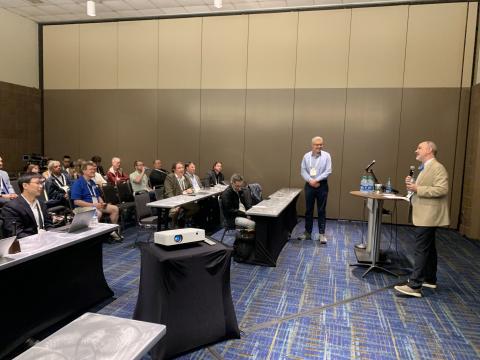
August 2023 - m/q hosts the first Decoding the Molecular Universe Workshop
Many fundamental research or applied mission goals have a common challenge when it comes to determining the role of biomolecules or chemicals. They require knowledge of what (bio)molecules are present, how they contribute to a phenotype, and/or what effect they may have on human health or the environment (i.e., are they a threat?).
m/q brought representatives from relevant agencies, national labs, and academia together to discuss common needs, gaps, and what new knowledge is waiting to be discovered within the vast chemical universe.
Read and download the workshop report here.
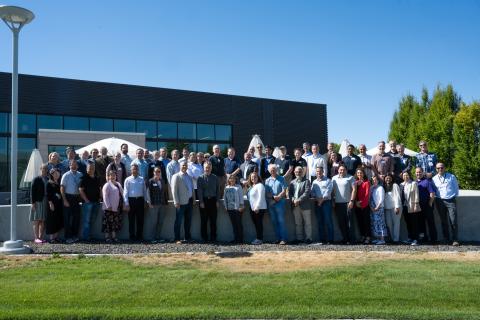
2023 at a glance - m/q Infographic
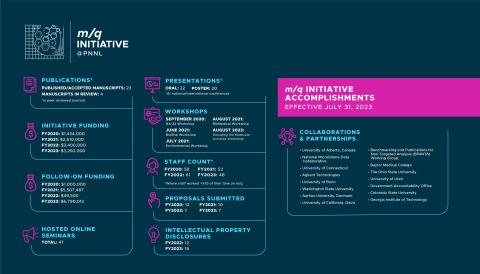
June 2023: Chemists Are on the Hunt for the Other 99 Percent
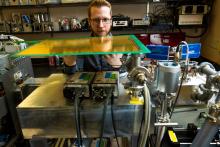
The universe is awash in billions of possible chemicals. But even with a bevy of high-tech instruments, scientists have determined the chemical structures of just a small fraction of those compounds, maybe 1 percent.
Scientists at the Department of Energy’s Pacific Northwest National Laboratory (PNNL) are taking aim at the other 99 percent, creating new ways to learn more about a vast sea of unknown compounds. There may be cures for disease, new approaches for tackling climate change, or new chemical or biological threats lurking in the chemical universe.

Tom Metz and Robert Ewing traveled to the 2023 DHS Security, Development, Test and Evaluation Summit. The 2023 Department of Homeland Security Research, Development, Test and Evaluation (RDT&E) Summit in partnership with the Department of Energy (DOE) National Laboratories will inform DHS components of future and current RDT&E capabilities available to advance the Homeland Security Mission. This Summit allows for select DHS S&T Laboratories and DOE National Laboratories to present and discuss cutting-edge research projects and capabilities applicable to the Homeland Security Enterprise. They gave a Town Hall presentation titled "Advancing Reference-Free Measurement of Biological and Chemical Threat Detection with Mass Spectrometry" highlighting the m/q initiative.
January 2023: m/q Initiative Highlighted in DHS Center Annual Report
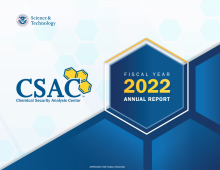
The Department of Homeland Security Science and Technology Directorate Chemical Security Analysis Center (CSAC) highlighted engagement with the m/q Initiative in its Fiscal Year 2022 Annual Report. CSAC is “the Nation’s only federal studies, analysis, and knowledge management center for assessing the threat and hazard associated with an accidental or intentional large-scale chemical event or chemical terrorism event in the United States.” In the report, CSAC mentioned its invitation to participate on the m/q Initiative review board, noting that the initiative’s “high risk, but very high reward, projects would move the Homeland Security Enterprise closer to agent-agnostic detection, a key goal in the landscape of rapidly emerging threats.”
March 2022: Researchers update database to help first responders identify fentanyl

Work by m/q Initiative researchers is contributing to an effort at PNNL to build a database and computational risk assessment of fentanyl analogs—different forms of fentanyl with highly varying potencies. The m/q team has generated nearly 800 billion fentanyl analogs, which are being assessed to determine their relative risk. This work will help more quickly and accurately predict which forms of fentanyl may be encountered by law enforcement and relevant agencies in the future, with the goal of enabling them to be more proactive in their responses.
August 2021: Spotlight - m/q Initiative at PNNL, MetaboNews
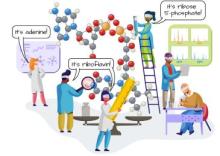
Excerpt: The m/q Initiative at PNNL is a 5-year, $12M investment that seeks to achieve a revolutionary transformation in the utility of and knowledge gained from molecular measurements through a comprehensive, unified, and predictive understanding of the chemistry and physics of all ions throughout an MS experiment. m/q exploits key institutional strengths in MS instrument development and application, and in molecular modeling, machine learning and applied statistics to develop new capabilities that support PNNL core research areas in decarbonization and energy storage; chemistry, biology, and earth sciences, and data science; and nuclear materials and threat analysis.
January 2021: Metz Elected MANA President

PNNL biomedical scientist and m/q Initiative lead Tom Metz has been elected president of the Metabolomics Association of North America. At PNNL, Metz leads a group of scientists that focuses on development and applications of high throughput metabolomics and lipidomics methods to various biological questions. His research primarily focuses on the study of diseases, such as diabetes and infectious diseases.